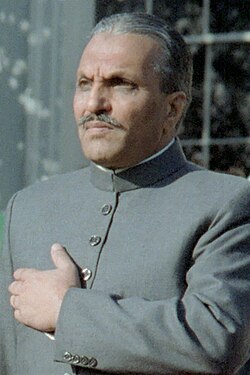| Operation Fair Play | |
|---|---|
| Part of the Cold War and Military coups in Pakistan | |
| Type | Strategic and tactical |
| Location | Prime Minister Secretariat, Islamabad |
| Planned by | General Headquarters (GHQ) |
| Objective | Relief of Prime minister Zulfikar Ali Bhutto from the Prime Minister Secretariat |
| Date | 5 July 1977 |
| Executed by | 111th Brigade, X Corps |
| Outcome | Success of coup d'etat led by General Zia-ul-Haq
|
| ||
|---|---|---|
Policies
Gallery: Picture, Sound, Video | ||
The 1977 Pakistani military coup (codenamed Operation Fair Play) was the second military coup in the history of Pakistan. Taking place on 5 July 1977, it was carried out by Muhammad Zia-ul-Haq, the chief of army staff, overthrowing the government of Prime Minister Zulfikar Ali Bhutto.
Contents
- Background
- 1977 general elections and political crises
- Coup
- Supreme Court
- International reactions
- Aftermath
- References
The coup itself was bloodless, and was preceded by social unrest and political conflict between the ruling leftist Pakistan Peoples Party government of Bhutto, and the right-wing Islamist opposition Pakistan National Alliance which accused Bhutto of rigging the 1977 general elections. In announcing the coup, Zia promised "free and fair elections" within 90 days, but these were repeatedly postponed on the excuse of accountability and it was not until 1985 that "party-less" general elections were held. Zia himself stayed in power for 11 years until his death in a 1988 plane crash.
The coup was a watershed event in the Cold War and in the history of Pakistan. It took place nearly six years after the 1971 war with India which ended with the surrender of Pakistan and the secession of East Pakistan, which became Bangladesh. The period following the coup saw the "Islamisation of Pakistan" and Pakistan's involvement with the Afghan mujahideen (funded by the US and Saudi Arabia) during their war against the Soviet Union.




